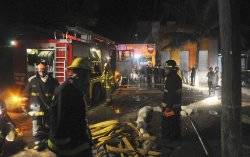Honduran President Porfirio Lobo has suspended the director of the Comayagua prison and the head of the national prison system after a massive fire at an overcrowded prison killed more than 350 people.
Porfirio Lobo said the suspensions would ensure a thorough investigation and promised to "take urgent measures to deal with this tragedy, which has plunged all Hondurans into mourning".
Justice Richard Ordonez, a supreme court judge who is leading the investigation, said officials had confirmed 358 people died in the fire.
The blaze began late on Tuesday night at the prison in Comayagua, about 75 km north of the capital Tegucigalpa.
Ordonez said with 856 inmates, the prison was populated to double its capacity.
Paola Castro, the local governor and a former prison employee, told reporters on Wednesday that an inmate called her moments before the fire and said he was going to set the facility on fire and kill everyone inside.
Survivors told investigators that an unidentified inmate screamed "We will all die here!" as he lit fire to his bedding.
Al Jazeera's Andy Gallacher in Comayagua said that there were several theories regarding how the fire started.
"Some say that a prisoner started it and other that it was started externally, but I can tell you that there are scenes of chaos here.
"Forensic experts here say that it will be two or three days before they can start identifying the bodies that are badly burned," our correspondent said.
The blaze spread within minutes, killing about 100 inmates in their cells as firefighters struggled to find officials who had keys, Josue Garcia, a Comayagua fire department spokesman, said.
"We couldn't get them out because we didn't have the keys and couldn't find the guards who had them," Garcia said.
Other prisoners were set free by guards but died from the flames or smoke inhalation as they tried to flee into the fields surrounding the facility, where prisoners convicted of crimes grow corn and beans on a state-run farm.
Rescuers carried shirtless, semi-conscious prisoners from the facility by their arms and legs. One hauled a victim away from the fire by piggyback.
Officials have long had little control of conditions inside many Honduran prisons, where inmates have largely unfettered access to mobile phones and other contraband.
Rescue delay
Castro once worked as a secretary at the prison and is known by many inmates. She said she called the Red Cross and firefighters immediately to alert them of the danger.
Two employees of a hotel near the prison told The Associated Press that firefighters took between 20 and 30 minutes to arrive, and by then the flames had nearly subsided.
A prisoner identified as Silverio Aguilar told HRN Radio that he first knew something was wrong when he heard a scream of "Fire! fire!"
"For a while, nobody listened. But after a few minutes, which seemed like an eternity, a guard appeared with keys and let us out," he said.
He said there had been 60 prisoners packed into his cell.
Some 475 people escaped, said Hector Ivan Mejia, a spokesman for the Honduras security ministry. He said 21 people had been injured.
'Hellish' scenes
Garcia, the Comayagua fire department spokesman, said he saw "hellish" scenes while trying to put out the fire, with many prisoners "burned to death or suffocated in their cells".
Witnesses said some of the inmates escaped the blaze by jumping from the prison rooftop, and there were reports that some of them had fled the facility and were on the loose.
Local firemen said they were prevented from entering the prison due to shooting.
Honduras has the highest murder rate in the world, recording more than 80 homicides per 100,000 people in 2009, a rate 16 times that of the US, according to a UN report last year.
There are frequent riots and clashes between members of rival street gangs in its overcrowded prisons.
The gangs, known as "maras", started in the US and then spread to Central America, with members covered in distinctive tattoos and involved in drug trafficking, armed robbery and protection rackets.
Honduras is also a major drug-trafficking transit point for South American cocaine moving north to consumers in the US, and authorities say there is an increasing presence of violent Mexican drug cartels in the country.
Across Honduras, prisons are filled to double their capacity. The facility in Comayagua housed more than 800 inmates - well above its capacity.
More than 100 prisoners were killed in a fire in the textile manufacturing town of San Pedro Sula several years ago.
PHOTO CAPTION
Firefighters stand outside of the prison in Comayagua, Honduras, a town 90 miles (140 kilometers) north of the Central American country's capital, Tegucigalpa, early Wednesday, Feb. 15, 2012.
Al-Jazeera

 Hajj virtues
Hajj virtues